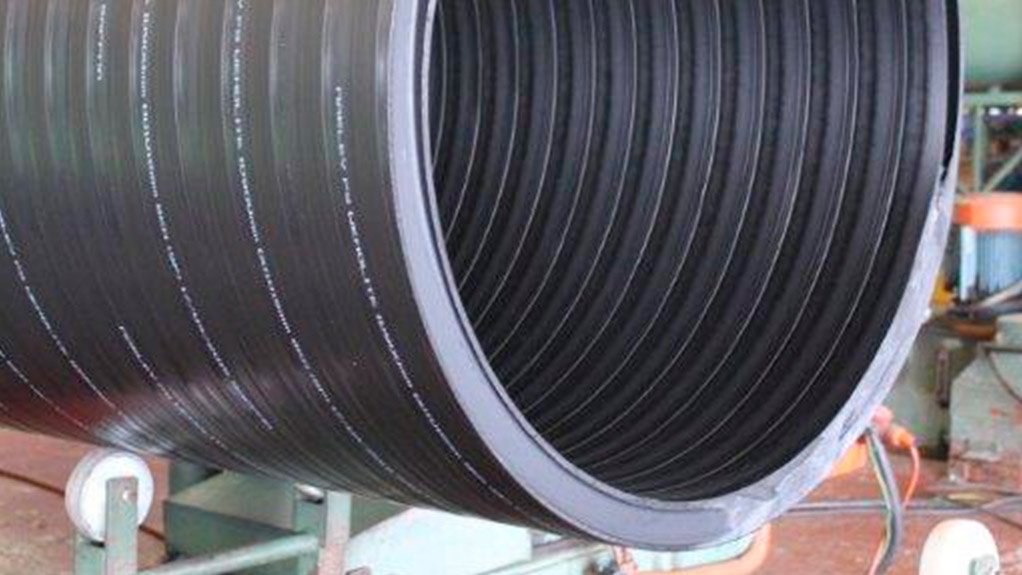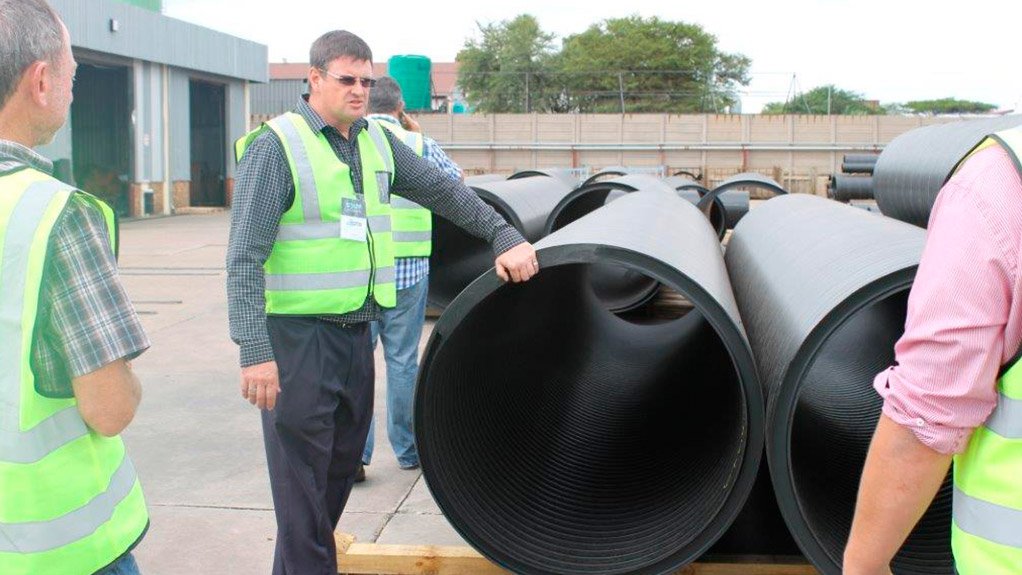Manufacturer partners with industry bodies to improve standardisation



QUALITY PIPING Marley Pipes is playing an integral role in trying to improve manufacturing standards in the plastic pipe industry
IAN VENTER Marley Pipes is working closely with the South African Plastic Pipes Manufacturing Association and forms part of technical committees that work closely with the SABS to write new standards
Most of the South African national standards for plastic pipes manufacturing are considerably outdated, which is why plastic pipes manufacturer Marley Pipe Systems has decided to partner with key organisations in South Africa to assist in formulating the manufacturing standards specific to the country’s needs and applications.
“Bedding and backfill standards for plastic pipes were last written and updated in 1984,” says Marley Pipe product specialist Ian Venter. He tells Engineering News that Marley Pipe is working closely with the South African Plastic Pipe Manufacturers Association and forms part of the technical committees that work closely with the South African Bureau of Standards (SABS) to write new standards.
He acknowledges that the struggles the SABS currently faces regarding the bureau’s capacity to regulate and maintain quality, and highlights that Marley Pipe is educating its clients about the manufacturer’s responsibility to prove their compliance with standards and regulations.
“It is common practice for clients or end-users to simply look for the SABS mark on the product. However, this only means that, at some stage, someone handed over a sample of the product to the SABS for testing. If clients are looking for consistency in the quality of products then the manufacturer must prove that compliance,” Venter reiterates.
He further highlights that permit conditions state that manufacturers must independently and continuously conduct daily, monthly and yearly assessments on their products to ensure quality compliance.
End-users are also responsible for ensuring that the quality of the products they buy have been validated with regard to quality compliance.
“In the past, the manufacturing system did not require validation checks to be completed and I believe that is partly the reason why there are so many water leaks, for instance,” he reveals.
Venter tells Engineering News that, amid the challenges facing the pipes manufacturing industry with regard to quality and standards processes, Marley Pipe continues to maintain its key manufacturing principles, which include capacity and technical support as well as a commitment to quality without compromise throughout the business.
“This is to ensure that Marely Pipe’s focus is on introducing the correct high-quality product into the market; it also enables the company to influence all the stages of the production process, subsequently allowing for compliance control and control over the finished product,” he explains.
Marley Pipe manufactures most of its polyethylene pipes systems at its mining and industrial head office based in Rosslyn, Pretoria, while the polyvinyl chloride pipes are manufactured at the company’s Nigel plant, in Gauteng.
Venter says Marley Pipe’s manufacturing of products that are exported to Europe and the US, and distributed to Germany for redistribution to the rest of Europe, makes the company unique. As such, the company’s South African facilities have to deliver high standards to meet the demands of the European market.
Marley Pipe’s industrial head office covers 41 596 m2 with factories and warehousing facilities accounting for 9 500 m2.
The company has more than 20 production lines that produce about 2 000 t of polyethylene pipes systems.
Marley Pipe polyolefins and petroplas product specialist Willem Locke tells Engineering News that, like most industries in South Africa, the pipes industry is currently suffering from downward pressure on the pricing of products, which is why engineers responsible for designing products must know the reasons for specifying a product.
“It is vital to understand why a specific product is more expensive than what the competition offers because, in most cases, contractors will opt to select the cheaper product as long as it is accepted according to industry standards,” he says.
He explains that, in South Africa, many water pipes products were installed based on price only, and that the long-term benefits, advantages and economics were not taken into consideration.
“That is where Marley Pipe bridges the gap in offering technical support to end-users and making them aware that it is sometimes better to pay more for a better-specified quality product over a cheaper alternative,” he says.
Part of the company’s technical support strategy is to supply accurate up-to-date information to inform clients about pipes systems selection and installation through technical manuals that serve as guidelines and reference points.
This includes Marley Pipe’s polyethylene technical manual and high-density polyethylene pressure manuals that encompass all the specifications, dimensions geometry and tolerances of the products manufactured by the pipes systems provider in a simplistic reference method.
Article Enquiry
Email Article
Save Article
Feedback
To advertise email advertising@creamermedia.co.za or click here
Announcements
What's On
Subscribe to improve your user experience...
Option 1 (equivalent of R125 a month):
Receive a weekly copy of Creamer Media's Engineering News & Mining Weekly magazine
(print copy for those in South Africa and e-magazine for those outside of South Africa)
Receive daily email newsletters
Access to full search results
Access archive of magazine back copies
Access to Projects in Progress
Access to ONE Research Report of your choice in PDF format
Option 2 (equivalent of R375 a month):
All benefits from Option 1
PLUS
Access to Creamer Media's Research Channel Africa for ALL Research Reports, in PDF format, on various industrial and mining sectors
including Electricity; Water; Energy Transition; Hydrogen; Roads, Rail and Ports; Coal; Gold; Platinum; Battery Metals; etc.
Already a subscriber?
Forgotten your password?
Receive weekly copy of Creamer Media's Engineering News & Mining Weekly magazine (print copy for those in South Africa and e-magazine for those outside of South Africa)
➕
Recieve daily email newsletters
➕
Access to full search results
➕
Access archive of magazine back copies
➕
Access to Projects in Progress
➕
Access to ONE Research Report of your choice in PDF format
RESEARCH CHANNEL AFRICA
R4500 (equivalent of R375 a month)
SUBSCRIBEAll benefits from Option 1
➕
Access to Creamer Media's Research Channel Africa for ALL Research Reports on various industrial and mining sectors, in PDF format, including on:
Electricity
➕
Water
➕
Energy Transition
➕
Hydrogen
➕
Roads, Rail and Ports
➕
Coal
➕
Gold
➕
Platinum
➕
Battery Metals
➕
etc.
Receive all benefits from Option 1 or Option 2 delivered to numerous people at your company
➕
Multiple User names and Passwords for simultaneous log-ins
➕
Intranet integration access to all in your organisation



















